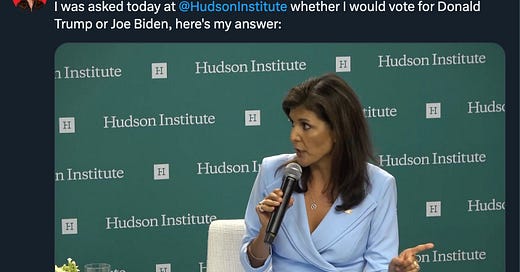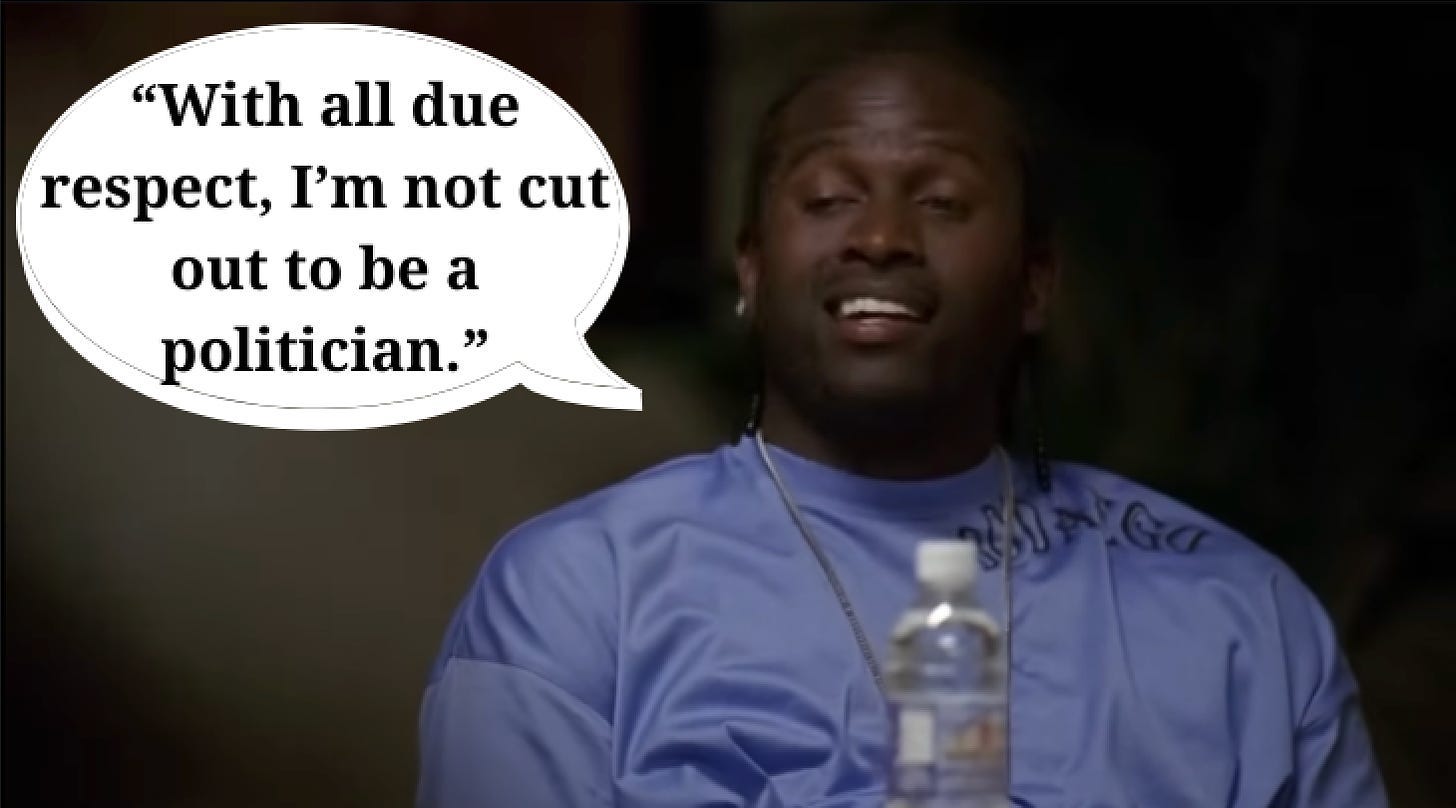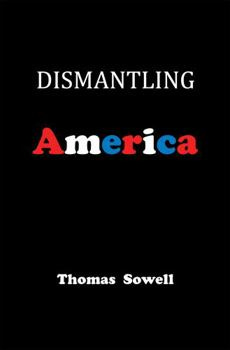Et tu, Nikki?
Former Gov. Nikki Haley, a one-time presidential hopeful, joins the chorus of Republicans endorsing the former president for re-election. If only she'd watched The Wire, she'd know it won't end well.
Quote of the week
“Politicians will always disappoint you.” —Jonah Goldberg, Where Do Haley Voters Go?
Lost among all the gnashing of teeth at the conviction of the former president last week in New York was a bit of news from a few days earlier, when former presidential candidate Nikki Haley did what she hinted at never doing but that anyone who has followed her political career knew she’d always come around to doing: throwing her support behind the former president in the race against Biden.
“I will be voting for Trump,” said Haley, former U.N. ambassador to Pres. Trump, during what was obviously a planned announcement at the Hudson Institute, an organization she joined in April. “Having said that, I stand by what I said in my suspension speech. Trump would be smart to reach out to the millions of people who voted for me and continue to support me and not assume that they’re just going to be with him. And I genuinely hope he does that.”
There was no other way
Look, I’m not going to pretend to care about Haley as a candidate for president. Yes, I was hopeful that she’d get the nod over the former president, but she’s in the same boat with “Woke Warrior” DeSantis for me: An option if all else fails, but I hope neither becomes president. For DeSantis, he’s the antithesis of what I believe suffices as a conservative politician (conservative commentator Megyn Kelly pressed him on this point in a 2023 interview) because of his willingness to use the power of the state to punish corporations.
Haley is a likeable candidate who checks all of the boxes for me, but as conservative writer David French wrote in a NYT Q&A, “she’s a conventional Republican [at a time when the] Republican base has fundamentally transformed and traditional ideological conservatives are at best an imperfect fit for the G.O.P.”
I’ve written before that, while Tim Scott was my guy for the nod in 2024, I preferred Haley or DeSantis to anyone else if Scott was out. But, when Haley lost out on the nomination to the former president, I was hopeful that she, like former veep Mike Pence and former House Speaker Paul Ryan, would withhold her support from forty five. (I want a sane Republican party, not a cult of one man.)
However, Haley, who is a young 52, was always going this route, many believe, including The Dispatch’s Nick Catoggio. She almost certainly wants to run for president in the near future, and she has to know that she’ll need the supporters of the former president. The math she employed must have looked something like this: moderates + anti-Trumpers < Trumpers.
She felt like, no matter how costly the move proved in the short-term, it would be worth it to retain the possibility of support from 45’s supporters. And while I think she’ll be proved wrong in the end, in that she’ll never get their support or be a strong contender for president in the future, I do understand her logic: Why throw away my political future over principles?
‘The game is the game’
I write here about Haley because I think there are lessons to be learned from national politics. I remember, in 2020, expressing my frustrations about politics at all levels to a friend. His words took me back to my days of growing up in a rural farming community.
“Politics is sausage; it’s not steak.”
What he was saying—and that I didn’t realize at the time—was politics is an ugly game, one that most who enter it with grand plans and idealistic notions of accomplishments have a hard time with once they see how the sausage is made.

The line that best sums up politics for me personally comes from The Wire, the crime drama series created by David Simon in the early aughts. The most famous line from the show is one I say at least once a week.
“The game is the game.”
The meaning is simple: In this game things work a certain way, regardless of who the players are; stray from the course at your own risk.
If Haley wasn’t aware of this reality, she will be acquainted with it real fast.
What I learned
As I wrap up my second, and final, term as a local elected official, I frequently get asked “What’s next? You’ll run again, right?” I’ve taken to saying “I’m unelectable.” I’m only half joking. At lunch with a friend last summer, he challenged the notion of me being unelectable.
“What does that mean? You can’t be unelectable.”
Then, I shared my feelings on who I would and would not support in the general election for president: neither the current nor the former president. While that perspective wouldn’t prevent me from getting elected, depending upon what I was running for, it sure would add a great deal of friction, as it would open the door for an opponent to tar me with the RINO label, which can sound the death knell for support in Republican primaries.
“See?” I said. “Unelectable.”
He laughed before saying, “Yeah, sharing that view, if asked, wouldn’t help your chances of getting elected in the near future.”
I’m fine with that, by the way. I’m not a politician. I’ve never believed that politics is an effective mechanism to get things done. I believe even more in that statement now, in large part because today’s politicians are focused so much on their political futures that they’re afraid to piss off their bases, even if doing so is the right course of action. That’s not me. At all. (See: not a politician.)
“No one will really understand politics until they understand that politicians are not trying to solve our problems. They are trying to solve their own problems—of which getting elected and re-elected are number one and number two. Whatever is number three is far behind.” —pre-eminent economist Thomas Sowell, in the book Dismantling America.
There are better avenues than politics
Yet, as I tell residents, there are lots of (better) options to get involved in your local communities than politics. I recommend folks apply for boards and commissions, form their own groups or support a broader group of organizations. Municipalities, local chambers of commerce and school districts offer plentiful opportunities to support your local community.
For example, immediately upon moving to where I live now, I applied for a board & commission seat, took part in the department of public service academy and was a member of the school district’s program to make residents aware of how things work inside our ISD.
I learned a lot, made great friends that I still have to have to this day, and came to feel more a part of the community I’d go onto serve, first as a member of the zoning board of adjustment and later as a councilman. Many folks I talk to would like to run for office, but they are afraid of running a campaign and all that it brings. They are also afraid to run and lose.
To steal another line from The Wire: “The game is rigged. But you cannot lose if you do not play.”
By all means, run for office if you feel so inclined, but don’t think that’s the only—or the best—way to be a vibrant part of your community. There are lots of great options, especially if you aren’t tethered to the notion that civic duty requires you to compromise your values. (I’m not saying success in politics requires you to compromise your integrity; I am saying a commitment to politics at all costs will do more than test your integrity.)
Nikki Haley is going learn this lesson the hard way. But you don’t have to.






